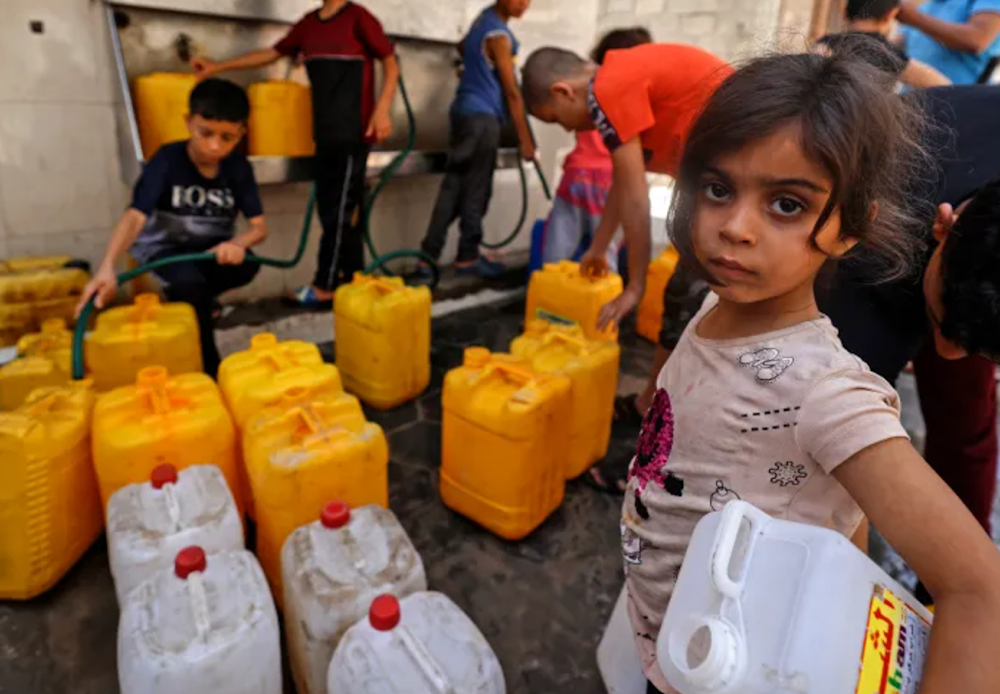Gaza children waiting up to 8 hours to get water: UNRWA
The World Health Organization says more than 150,000 persons in the Palestinian territories have suffered skin ailments as a result of the deplorable conditions.
-

Palestinian children fill up containers with water in Gaza City in May 2021. (AFP)
Minors in Gaza are struggling for over 6-8 hours a day to collect food and water, UNRWA reported.
Children in Gaza can spend 6-8 hours a day collecting water and food, often carrying heavy weights and walking long distances, the agency detailed.
In a post on X, the agency described how children are usually forced to walk long distances to bring food and water to where they are staying. In addition, the agency noted that "sanitation facilities & infrastructure are severely compromised, forcing thousands of families to rely on seawater to wash, clean & even drink"
Children in #Gaza can spend 6-8 hours a day collecting water & food, often carrying heavy weights & walking long distances
— UNRWA (@UNRWA) July 6, 2024
Sanitation facilities & infrastructure are severely compromised, forcing thousands of families to rely on seawater to wash, clean & even drink#CeasefireNow pic.twitter.com/hUCXLf7rom
On day 274 of the Israeli genocide in Gaza, the number of Palestinians killed by the Israeli occupation reached 38,098, in addition to 87,705 injuries, according to the daily report published by the Health Ministry in Gaza.
"Israel" committed three massacres in 24 hours, killing 29 Palestinians and injuring 100 others.
This Palestinian child lost an arm, a leg, and an eye in an Israeli airstrike targeting his family’s home in Gaza. pic.twitter.com/P7YtFraWsM
— PALESTINE ONLINE 🇵🇸 (@OnlinePalEng) July 6, 2024
Dangerous skin diseases rampant in Gaza children
According to RFI news, many Palestinians in Gaza suffer from skin disorders including scabies, chicken pox, lice, impetigo, and other severe rashes.
According to the World Health Organization, more than 150,000 persons in Gaza have suffered skin ailments as a result of the deplorable conditions into which displaced Palestinians have been pushed due to "Israel's" aggression on the strip.
Elwan, who lives on a sandy patch near the sea close to Deir al-Balah, told RFI, "We cannot bathe our children as before. There are no hygiene and sanitary products for us to wash and clean the place."
Children seen at a clinic had dozens of chickenpox-induced blisters and scabs all over their hands, feet, backs, and tummy.
According to Hamid, a pharmacist, the hot water and "lack of clean water" harm children's skin.
Mohammed Abu Mughaiseeb, Doctors Without Borders (MSF) medical coordinator in Gaza, told AFP that children are vulnerable because "they are children -- they play outside, they'll touch anything, eat anything without washing it."
According to Abu Mughaiseeb, hot weather promotes more perspiration and dirt collection, which create rashes and allergies, which, if scratched, can lead to illness.
MSF specialists are concerned about the emergence of additional skin illnesses like leishmaniasis, which may be lethal in its most severe form.
He also emphasized that a weakened immune system due to extreme hunger is exacerbating Gaza's children's risk.
Last month, approximately 50 children experienced malnutrition and starvation in the northern area of the region due to the Israeli total blockade on Gaza, said Husam Abu Safiya, the director of Gaza's Kamal Adwan Hospital.
In addition, most hospitals in the Gaza Strip are no longer operational because of the continuous aggression. In the Gaza Strip, 96% of people live in extreme food insecurity, as confirmed by the Palestine Red Crescent (PRCS) on the X platform.

 3 Min Read
3 Min Read








